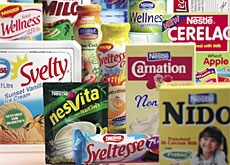Nestlé serves up food for the future

Scientists at Nestlé's research centre near Lausanne are creating the health food of the future.
Drawing on its long innovative tradition, the company is developing food products tailored to the needs of the individual. But this process is not without its critics.
“For more than a century the principle need has been to cover the food requirements of a growing population,” says Nestlé chief executive Peter Brabeck in a promotional film at the Nestlé Research Center (NRC). “Now consumers are looking for something more, for example – health.”
Richer countries are suffering from increased health problems such as obesity, diabetes and heart conditions – due in part to an unhealthy diet.
This is one reason Nestlé has decided to focus its research activities on the wellbeing and health sector.
It sees the future in developing food products that are balanced and contain added health benefits for specific needs – so-called “functional food”.
“Our long-term aim is that the whole range of Nestlé products will include nutritional additives and will offer health benefits for consumers,” NRC spokeswoman Hengameh Van der Kaaij told swissinfo.
Healthier products
Nestlé says 700 products have been overhauled so far. The fat content was reduced in 58 per cent of the cases, the calories in 56 per cent and the amount of sugar in 25 per cent.
So-called Branded Active Benefits (BABs) have been added to many products.
“These are mixtures of molecules which, based on the needs of consumers and after accurate scientific tests, have been added to foodstuffs,” said Van der Kaaij.
Aimed at increasing nutrient content, BABs include probiotic bacteria LC1 in yoghurt which is said to improve digestive health, the Actigen E compound of vitamins and minerals which optimizes energy release, and the fatty acid compound Omega 3:6 which helps promote cardiovascular health.
Nestlé is not alone in its new focus – Danone, Unilever and fast-food chain McDonalds have all started to focus on functional food.
“Good Food, Good Life” is Nestlé’s slogan, but the move is not all about health. Functional food is also big business.
According to a recently British study, the sector is worth an estimated SFr30 billion ($25 billion) worldwide.
In a decade, it is likely to account for ten percent of the international food market, it found.
Doubts
The sector seems a natural step for Nestlé, which has been producing innovative products for more than 100 years – from the first baby milk in 1867, to the first instant coffee, Nescafé, in 1938, to milk chocolate…
However, not everyone is convinced by this move towards tailored food.
“The best functional food is an apple or an orange. It’s as simple as that. They are natural, rich in vitamins and cheap,” says François Meienberg, food expert at the non-governmental organisation, the Berne Declaration.
According to Meienberg, Nestlé and other multinationals are trying to develop a high-priced segment of the market to boost profit margin on products such as cereals and yogurts which are normally sold at low prices.
“These new types of food are only a reaction to the unhealthy and sugar-heavy food habits which we have developed because of products made by multinationals,” added Meienberg.
Criticism is also forthcoming from the Consumer Protection Association, which says that in most cases there is no need for functional food.
“A natural and balanced diet and a bit of sport allows people to feel well and save money,” said the association’s head, Jacqueline Bachmann. “Unlike functional food…”
swissinfo, Marzio Pescia
Nestlé invests more than SFr1 billion a year in its research and development activities.
The functional food concept has been applied to around 700 products.
Elements are added or the foods adapted to satisfy certain nutritional requirements.
Nestlé, the leading food business ahead of Unilever, Kraft and Danone, is among the first 30 companies in the world in terms of capital.
It employs around 250,000 people in five continents. In 2005 its sales totalled SFr91 billion and its net profit was SFr7.9 billion.
The giant is moving towards the health and wellbeing sectors.
Its research centre is located at Vers-chez-les-Blancs, near Lausanne and was founded in 1997. It employs 650 people from 50 countries from, among others, the fields of medicine, biochemistry and microbiology.

In compliance with the JTI standards
More: SWI swissinfo.ch certified by the Journalism Trust Initiative
You can find an overview of ongoing debates with our journalists here. Please join us!
If you want to start a conversation about a topic raised in this article or want to report factual errors, email us at english@swissinfo.ch.